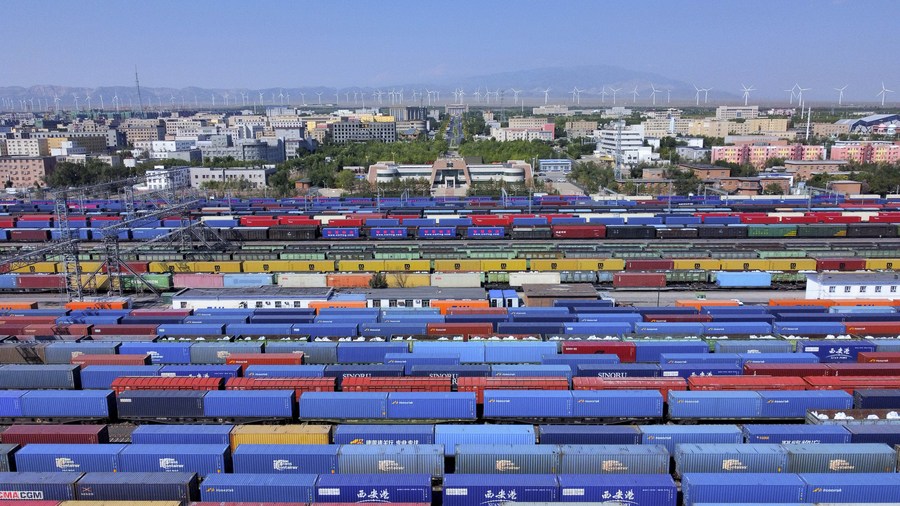




- BRNN
- BRI News
- BRNN News
- Database
Official Documents Polices and Regulations
Inter-government Documents International Cooperation BRI Countries
Business Guide Economic Data BRI Data
Trade
Investment Projects Latest projects
Cases - Content Pool
The China-Europe freight train service has witnessed a booming development and significant improvement across the board since the beginning of 2023.
During the first quarter of 2023, China-Europe freight trains made a total of 4,186 trips and transported 449,000 twenty-foot equivalent units (TEUs) of containers, up 15 percent and 28 percent, respectively, from the same period last year, according to data released by the China State Railway Group Co., Ltd. (China Railway) on April 10.

This aerial photo taken on Sept. 10, 2022 shows China-Europe freight trains at the Alataw Pass, northwest China's Xinjiang Uygur Autonomous Region. (Xinhua/Chen Qian)
Last month, China-Europe freight trains made 1,488 trips and transported 162,000 TEU containers of cargo which represented year-on-year increases of 31 percent and 52 percent, respectively, which showed that the monthly number of China-Europe freight train trips had exceeded 1,000 for the 35th consecutive month since May 2020.
The burgeoning development of the service is attributed to its increasingly dense service network and upgraded services, as well as the sound economic recovery across the country.
Since the beginning of the year, many cities in various parts of the country have launched their China-Europe freight train service, while new stations have been added to the existing routes of China-Europe freight trains.
On Jan. 22, the first China-Europe freight train service from Xinxiang city, central China's Henan Province to Fangchenggang city, south China's Guangxi Zhuang Autonomous Region began its journey with 70 TEUs of containers loaded with 855 tonnes of cargo.
After arriving in Fangchenggang, the cargo, which included auto parts, mechanical equipment, and recreational facilities, were transported to Association of Southeast Asian Nations (ASEAN) member countries by sea.
The opening of the new route, which followed similar services from Xinxiang to Hamburg, Germany, Liege in Belgium, and Hanoi in Vietnam, marked the realization of collaboration among multiple railway lines in all directions for China-Europe freight train services launched by Xinxiang.
Wuhan, capital of central China's Hubei Province, added three new routes to its China-Europe freight train services this year. The city now has 44 stable cross-border China-Europe freight train routes covering 109 cities in 40 Eurasian countries.
Rail-sea intermodal transport has ushered in new possibilities for the development of China-Europe freight trains.
On March 21, a cargo vessel from the port of Ho Chi Minh City, Vietnam arrived in Haitian Wharf, Xiamen city, southeast China's Fujian Province. After whisking through customs transit procedures, the cargo carried by the vessel was transported from Xiamen to Almaty in Kazakhstan by the China-Europe freight train service.
"Rail-sea intermodal transport enables cargo to be transported to their destination within only 20 days, which is 45 days shorter compared to the time it would have taken if the goods were transported all the way by sea. Rail-sea intermodal transport has become the best logistics choice for the transportation of cargo from Southeast Asia to Central Asia," said an executive from the Zhangzhou train depot of China Railway Nanchang Bureau Group Co., Ltd.
Continuous upgrading of infrastructure and service capacity has increased the efficiency of China-Europe freight trains.
On Feb. 3, Quanzhou city, Fujian Province changed the starting station of its China-Europe freight trains to Huangtang railway station, shortening the distance of the railway route by 213 kilometers and transport time by two days.
Xi'an Guojigang Railway Station in Xi'an city, capital of northwest China's Shaanxi Province, increased its loading and unloading capacity by 30 percent after expanding its capacity three times.
Zhengzhoubei Railway Station in Zhengzhou city, capital of Henan Province, has made continuous efforts to optimize China-Europe freight train marshaling, and has given priority to these trains in such links as receiving, examination, and dispatching to ensure that the trains depart on time.
In Wuhan, faster customs clearance benefited from the sharing of logistics data between customs and railway departments has reduced the time needed for customs clearance by one to two days for China-Europe freight trains.
Sound economic recovery has also contributed to the fast development of China-Europe freight trains in China.
Since China's new-energy vehicle (NEV) industry is flourishing, NEVs have become a new growth point for China-Europe freight trains in many cities across the country.
"We have rolled out a transport model for auto exports, which, combined with the advantages of China-Europe freight trains, including high efficiency, fast transfer, and the fact that they can directly go inland, has made the China-Europe freight train service a new choice of Chinese automakers like Geely and BYD to explore overseas markets," said an executive of the Xi'an Guojigang Railway Station.
China Railway Zhengzhou Bureau Group Co., Ltd. provides a customized transportation plan to customers based on the types of vehicles to be transported, according to an executive of the group.
Each container can carry up to four vehicles, significantly reducing the comprehensive logistics costs for auto export companies, the executive said.

Tel:86-10-65368972, 86-10-65369967